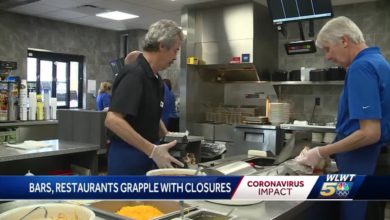
Temperatures will be in the mid to upper 90s this week, with the National Weather Service predicting a heat index of over 100.
As persistent hot weather begins around the Cincinnati area, there are a few resources available, from free fans and air conditioning units to cooling centers, you should know about.
Cincinnati weather:High temperatures, heat index reaching 100 possible next week
How to get a free fan or air conditioning
St. Vincent de Paul is partnering with Braun Heating & Air Conditioning to offer free fans and air conditioners to those in need across Hamilton County.
The organization distributes box fans on a walk-up basis at the Neyer Outreach Center on Bank Street during normal operating hours. Recipients must provide a photo ID and can only receive one fan every other year. There is a limit of one fan per household.
To qualify for an air conditioning unit, you must be 65 or older or have a medical need. Supplies are limited, so an application doesn't guarantee that you will receive one. There is a limit of one air conditioner per household, and households are eligible to receive one every five years.
You must fill out an application to request an air conditioner.
In Northern Kentucky, St. Vincent de Paul's Summer Breeze program offers free fans and air conditioning. For more information or to see if you qualify, call 859-341-3219.
Where to go in Cincinnati when it's too hot
When a heat emergency is declared, all Cincinnati Recreation Centers become cooling centers, open during normal hours.

How to get help with cooling assistance
From July 1 to Sept. 30, eligible Hamilton County residents may receive cooling assistance through a one-time benefit from the Home Energy Assistance Summer Crisis Program.
The program's goal is to assist with electric utility bills or the purchase of an air conditioning unit or a fan.
When is the first day of summer?:Here's what to know about the summer solstice.
Warren County Community Services Inc. offers a summer crisis program that provides financial assistance to eligible recipients, age 60 or older, with their electric bills. For more information, visit the website or contact the Warren County Community Services Inc. office at 513-695-2100.
How to help manage Duke Energy costs this summer
The Low-Income Home Energy Assistance Program is an income-based assistance program that allows people below certain income thresholds to qualify for federal energy bill assistance money.
Qualifying income thresholds are based on factors including household income and the number of people living in your home.
To learn how to qualify or apply, call 800-456-3452.
What are the signs of heat-related illness?
According to the Centers for Disease Control and Prevention, heat-related illnesses include heat stroke, heat exhaustion, heat cramps, sunburn and heat rash.
Here are the signs and actions to take if you suspect any of these heat related illnesses.
Heat stroke
- High body temperature (103 degrees or higher).
- Hot, red, dry or damp skin.
- Fast, strong pulse.
- Headache.
- Dizziness.
- Nausea.
- Confusion.
- Losing consciousness.
Call 911 immediately as heat stroke is a medical emergency. Move the person to a cooler place. To help lower the person's temperature, use cool cloths or a cool bath and do not give the person anything to drink.
Heat exhaustion
- Heavy sweating.
- Cold, pale and clammy skin.
- Fast, weak pulse.
- Nausea or vomiting.
- Muscle cramps.
- Tiredness or weakness.
- Dizziness.
- Headache.
- Fainting.
To combat heat exhaustion, move to a cool place, loosen your clothes, put cool, wet cloths on your body or take a cool bath and sip water. Get medical help immediately if you are throwing up, your symptoms get worse or if your symptoms last longer than an hour.
Heat cramps
- Heavy sweating during intense exercise.
- Muscle pain or spasms.
If you suspect heat cramps, stop physical activity and move to a cool place, drink water or a sports drink and wait for cramps to go away before you do any more physical activity. Get medical help right away if cramps last longer than one hour, if you're on a low sodium diet or if you have heart problems.
Sunburn
- Painful, red and warm skin.
- Blisters on the skin.
If you have a sunburn, stay out of the sun until your sunburn heals, put cool cloths on sunburned areas or take a cool bath, put moisturizing lotion on sunburned areas and do not break blisters.
Heat rash
- Red clusters of small blisters that look like pimples on the skin (usually on the neck, chest, groin or in elbow creases.)
If you have a heat rash, stay in a cool, dry place, keep the rash dry and use powder (like baby powder) to soothe the rash.
Source link






